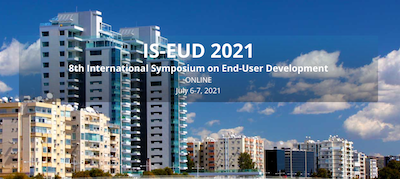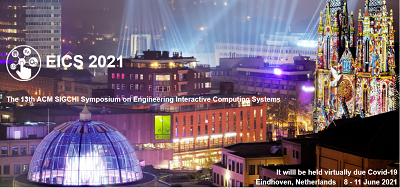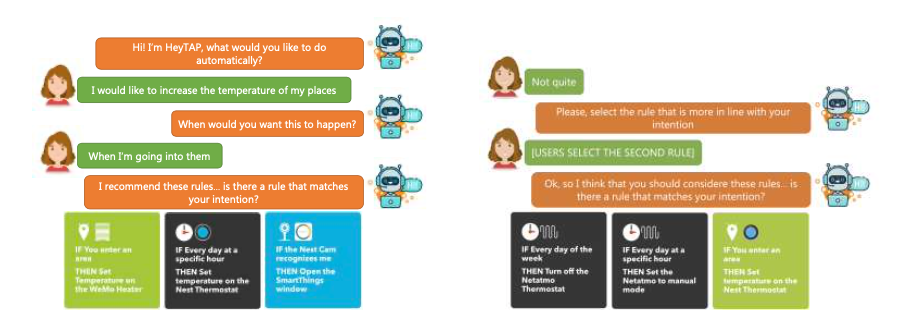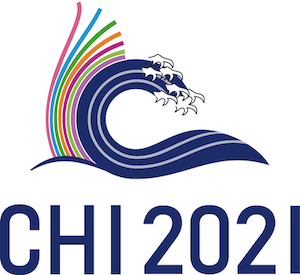- Details
The e-Lite group will participate at the 8th International Symposium on End-User Development (IS-EUD). The conference will be held virtually due to Covid-19 on 6-7 July, 2021.
Alberto will present a paper entitled "Devices, Information, and People: Abstracting the Internet of Things for End-User Personalization" on Tuesday, July 6 during the "Revisiting End-User Development" session (10:30-12:30). The paper investigates how users would personalize their Internet of Things ecosystems through trigger-action rules. It explores, in particular, which "things" users would personalize and in which contexts, and it classifies the abstractions with which users would create their trigger-action rules. This work is part of the research activities on End-User Development in the IoT.
Additional information:
- Paper at PORTO@IRIS
- DOI: 10.1007/978-3-030-79840-6_5
- Full conference program
- Details
On the 22nd of June, the e-Lite group participated in the 10th International Workshop on the Reliability of Intelligent Environments (WoRIE 2021), a workshop held within the 17th International Conference on Intelligent Environments (IE 2021). According to the current COVID-19 situation, IE2021 was not held in person at Middlesex University Dubai, UAE, and was moved entirely online.
During this event, Luca Mannella presented a paper entitled: Perception of Security Issues in the Development of Cloud-IoT Systems by a Novice Programmer.
In this paper, starting from a use case, we analyzed the security of some IoT components of Amazon Web Services (AWS) from a novice programmer's point of view. Even if such a platform could be secure by itself, a novice programmer could do something wrong and leave some possible attack points to a malicious user.
In this study, we also surveyed a small group of novice IoT programmers from an Italian consulting engineering company. Even if we discovered that AWS seems quite robust, we noticed that some common security concepts are often not clear or applied by the novice, leaving the door open to possible issues.
- Details
The e-Lite group will participate at the 13th ACM SIGCHI Symposium on Engineering Interactive Computing Systems (EICS 2021) with a Late-Breaking Work (LBW) entitled "On Computational Notebooks to Empower Physical Computing Novices." EICS 2021 will be held virtually due to Covid-19 from 8-11 June 2021.
In this paper, a tool (built on top of the Jupyter computational notebook) is proposed to support step-by-step assisted learning and knowledge sharing. In particular, the Jupyter notebook functionalities were extended, and a custom-tailored kernel was implemented to seamlessly enable the interaction between the end-user web interface and the Arduino boards. This approach might effectively support physical computing novices in understanding, writing, and executing the code while empowering them to document and share the development steps they followed.
Juan Pablo Sáenz will present the work on Thursday, June 10, from 14:45 to 15:45.
Additional information:
- Paper at PORTO@IRIS
- DOI: 10.1145/3459926.3464752
- Full conference program
- Details
People, especially young adults, often use their smartphones out of habit: they compulsively browse social networks, check emails, and play video-games with little or no awareness at all. While the literature analyzed this phenomena qualitatively, e.g., by showing that users perceive it as meaningless and addictive, yet our understanding of how to discover smartphone habits and mitigate their disruptive effects is limited. Being able to automatically assess habitual smartphone use, in particular, might have different applications, e.g., to design better digital wellbeing solutions for mitigating meaningless habitual use.
The paper "Understanding, Discovering, and Mitigating Habitual Smartphone Use in Young Adults", recently accepted by the ACM Transactions on Interactive Intelligent Systems, tries to close this gap.
The paper first defines a data analytic methodology based on clustering and association rules mining to automatically discover complex smartphone habits from mobile usage data. The methodology was then assessed over more than 130,000 phone usage sessions collected from users aged between 16 and 33, and we show evidence that smartphone habits of young adults can be characterized by various types of links between contextual situations and usage sessions, which are highly diversified and differently perceived across users.
The proposed methodology was applied in Socialize, a digital wellbeing app that i) monitor habitual smartphone behaviors in real time, and ii) uses proactive notifications and just-in-time reminders to encourage users to avoid any identified smartphone habits they consider as meaningless. An in-the-wild study demonstrates that Socialize can assist young adults in better controlling their smartphone usage, with a significant reduction of their unwanted smartphone habits.
- Details
In the Internet of Things, users are willing to personalize the joint behavior of their connected entities, i.e., smart devices and online service, by means of trigger-action rules such as "IF the entrance Nest security camera detects a movement, THEN blink the Philips Hue lamp in the kitchen." Unfortunately, the spread of new supported technologies make the number of possible combinations between triggers and actions continuously growing, thus motivating the need of assisting users in discovering new rules and functionality, e.g., through recommendation techniques.
The paper "From Users' Intentions to IF-THEN Rules in the Internet of Things", recently accepted by the ACM Transactions on Information Systems, introduces HeyTAP², a semantic Conversational Search and Recommendation (CSR) system able to suggest pertinent IF-THEN rules that can be easily deployed in different contexts starting from abstract users' needs.
By exploiting a conversational agent, the user can communicate her current personalization intention by specifying a set of functionality at a high level, e.g., to decrease the temperature of a room when she left it. Stemming from this input, HeyTAP² implements a semantic recommendation process that takes into account a) the current user’s intention, b) the connected entities owned by the user, and c) the user's long-term preferences revealed by her profile. If not satisfied with the suggestions, the user can converse with the system to provide further feedback, i.e., a short-term preference, thus allowing HeyTAP² to provide refined recommendations that better align with the her original intention.
Finally, HeyTAP² was evaluated by running different offline experiments with simulated users and real-world data. On the one hand, we tested the recommendation process in different configurations, and we show that recommendation accuracy and similarity with target items increase as the interaction between the algorithm and the user proceeds. On the other hand, we compared HeyTAP² with other similar baseline recommender systems. Results demonstrate the effectiveness of HeyTAP² in recommending IF-THEN rules that satisfy the current personalization intention of the user.
- Details
We are happy to announce that we have one full paper and a Late-Breaking Work (LBW) accepted at CHI 2021, the premier international conference of Human-Computer Interaction. ACM CHI 2021 will be held this week (May 8-13) online. Both the paper and the LBW are about digital wellbeing: the paper features our work on digital wellbeing in a multi-device setting, while the LBW introduces novel patterns for reducing risk in web-based digital self-control tools.







